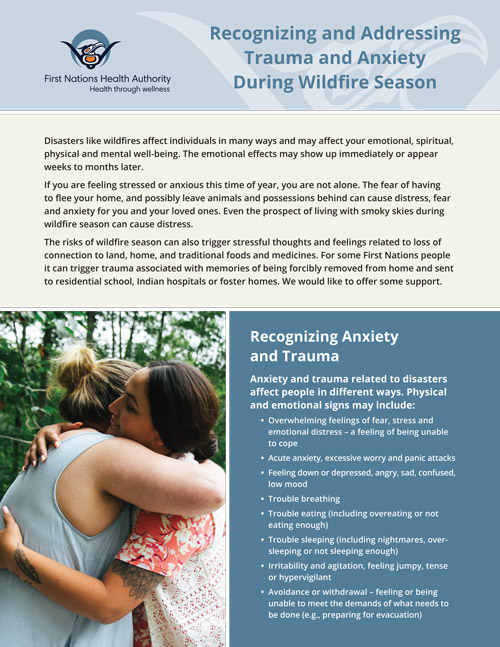Important wildfire information and resources to help you prepare
Wildfires and smoke are a normal part of summer in British Columbia, but our seasons seem to be getting longer and more extreme. We cannot predict when big wildfires will occur, so it is best to prepare for a smoky summer before the season starts.
Reducing exposure to wildfire smoke is the best way to protect your health.
• Most people spend up to 90% of their time indoors, so clean indoor air is important.
• Purchase a portable air cleaner that uses HEPA filtration to remove smoke from the indoor air. Do your research to find something suitable for your needs.
• If you have forced air heating, talk to your service provider about what filters and settings to use during smoky conditions.
• Know where to find cleaner air in your community. Libraries, community centres, and shopping malls often have cooler, filtered air.
Be aware of people who should take extra care.
Some people may be more sensitive to smoke, including those with chronic conditions such as asthma, heart disease, or diabetes, as well as pregnant women, infants, young children, and the elderly.
• If you or members of your family have a chronic disease, work with your doctor to create a management plan for smoky periods.
• If you use rescue medications, make sure you have a supply at home and always carry them with you during wildfire season. Have a clear plan to follow if your rescue medications cannot bring your condition under control.
• If you are pregnant or caring for an infant through the summer months, make a plan for minimizing smoke exposures.
For people who spend time outdoors, there are still ways to reduce smoke exposure and its health impacts.
• If you care for groups of children or plan outdoor events, ensure that your organization has a smoke contingency plan.
• The harder you breathe, the more smoke you inhale. Take it easy to reduce smoke exposure.
There are many tools available to help you understand the air quality impacts of smoke. Reliable sources of information can help you stay protected.
• Install the AQHI Canada app on your Android or iOS device to monitor your area, and to get notifications when air quality changes.
• If you live somewhere without an AQHI reading, check the current map of fine particulate matter concentrations or PM2.5.
• The FireWork Forecast shows maps of predicted smoke impacts over the next 48 hours.
• Extreme wildfires often occur when it is very hot outside, which can also affect your health. Install the WeatherCAN app to get notifications about extreme temperatures and other important weather events.
Recognizing and Resolving Trauma in Children During Disasters

Recognizing and Addressing Trauma and Anxiety During Wildfire Season

